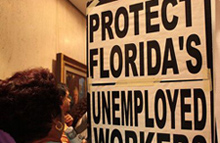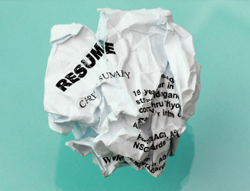Florida Workers to Lose Substantial Unemployment Benefits
30 October 2012

The good news is the unemployment rate has finallyunemployment benefits florida fallen in Florida. The bad news is that while it hasn’t fallen all that much, even that modest improvement in unemployment rates will result in a massive decrease in unemployment insurance benefits for Florida workers as of the beginning of the year.
This is because a lot of Florida’s unemployment insurance benefits were actually funded from Washington, under a large unemployment extension provision that Democrats pushed for in exchange for extending the so-called “Bush tax cuts” for another year, back in 2010.
Those tax cuts are slated to expire in January, as well, unless Congress acts to change the law.
Currently, Florida allows for 23 weeks of unemployment benefits. But workers receive an additional 37 weeks of benefits, if they qualify, because of the federal extension.
But Congress committed that money with strings attached: The federal unemployment dollars would only go to states with sufficiently high unemployment. As of last week Friday, Florida reported an unemployment rate of 8.7 percent. Much higher than the national average (now 7.8 percent), but not high enough to qualify for the federal unemployment extension.
Florida unemployment benefits already rank among the lowest in the country: Florida only replaces 25 percent of pre-unemployment earnings, while other states tend to replace up to half, which places Florida third to last in the country for unemployment benefit income replacement rate. The maximum unemployment benefit in Florida is only $275 per week, and the average actual benefit payout was about $231, the Palm Beach Post reported.
Furthermore, Florida is undergoing some fiscal constraints itself – and plans to cut their existing unemployment insurance benefits from 23 down to 19.
That’s about four months and three weeks from the time you begin receiving benefits. That’s a tough row to hoe – especially with the ranks of the long-term unemployed still at record highs. The National Employment Law Project estimates that some 41 percent of unemployed workers don’t find employment for 6 months or more. Meanwhile, the U.S. Department of Labor estimates that as much as 30 percent of unemployed people last year were out of work for more than one year. And according to reporting by the Palm Beach Post, 58 percent of individuals have not found a job by the time their benefits run out.
Furthermore, it’s getting more and more difficult for these long-term cast-offs from the employment market to find gainful employment: There is a growing trend among hiring managers to restrict recruiting to those who are currently working. The unemployed, state many ads, need not apply.
Florida workers aren’t alone in January. California, North Carolina, Illinois, Pennsylvania, Colorado and Texas will all see their federal extensions expire – potentially affecting up to 400,000 unemployed workers.
Originally, 39 states received federal unemployment benefits. After the new year, only eight states will remain on the program: New Jersey, Nevada, Rhode Island, West Virginia, Alaska, Idaho and the District of Columbia.
“These cuts are coming faster than the economy is improving,” said Christine Owens, executive director of the National Employment Law Project. “More workers will have to survive without any jobless assistance and families will have less money to put back into the economy.”
But ultimately, unemployment benefits have to come from somewhere – and that money’s being taken out of the economy too. Under current law, Florida employers have to pay anywhere from $180 to $420 per year for every worker in unemployment insurance benefits. This is a tax disincentive to hiring. While a strong economy can generally absorb that cost, if you make unemployment insurance premiums too high, fewer companies will hire – or they will use contractors or otherwise bring on workers off the books – denying the system needed income tax benefits and payroll tax benefits. Workers suffer from this, too, because they don’t have access to benefits such as health insurance and retirement plans.
Unemployed? Over a hundred of Florida-based jobs in Vitaver’s CAREERS section.




